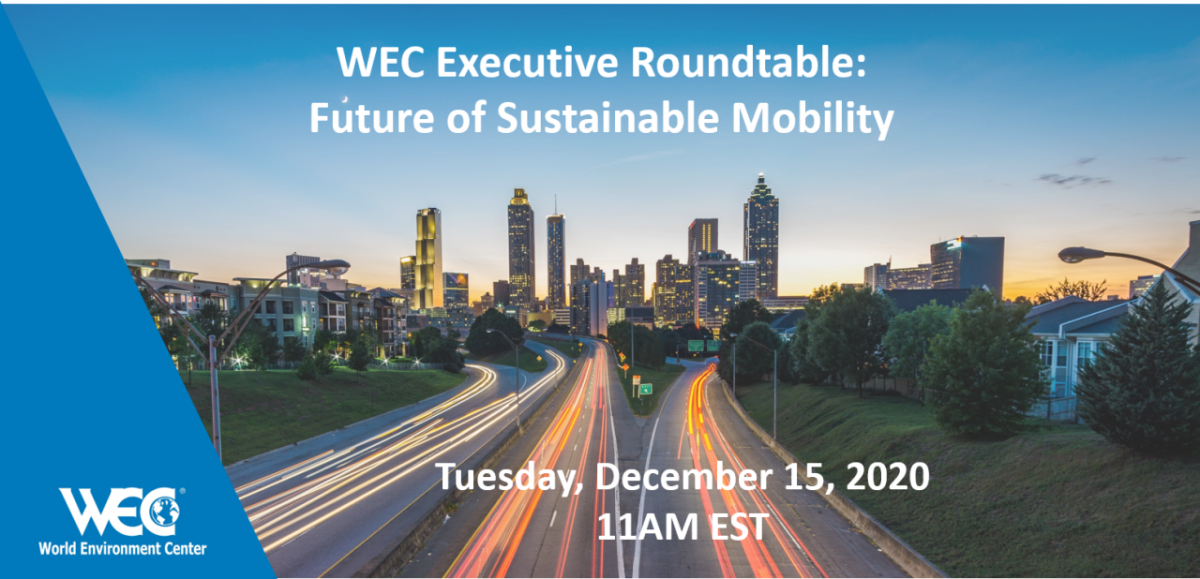WEC Gold Medal Roundtable Convenes Business Leaders on Future of Sustainable Mobility

Background
On the occasion of awarding the Gold Medal 2020 to Ford Motor Company, the World Environment Center convened an Executive Roundtable to learn from leaders in the transportation sectors about their efforts to drive sustainability in transportation and discuss further efforts required in the years ahead for mobility systems change. This Roundtable was designed to share goals and strategies, and to lead the global decarbonization efforts in mobility.
Participants:
Speakers represented key transportation sectors:
Automotive: Bob Holycross, Chief Sustainability, Environment & Safety Officer, Ford Motor Company
Energy: Philippe Montantême, Senior Vice President, Strategy Marketing Research, Total
Information Technology: Edan Dionne, Vice Pres., Environmental, Energy & Chem. Management Programs, IBM
Infrastructure: John Siraut, Global Technology Lead, Transport Economics, Jacobs
Policy & Planning: Dana Lowell, Senior Vice President, ERM
moderated by Glenn Prickett, President & CEO, World Environment Center
The Roundtable was held virtually in a webinar format, with approx. 30 senior executives from WEC member
Key Points
- Sustainable Mobility will be achieved by orchestrating several things at the same time, as a survey among the participating experts revealed. At least four important drivers of sustainable mobility have been identified, all of them equally important: (a) a completely new generation of automobiles, trains, airplanes and other means of transport, (b) technology and financial means to provide enough renewable power, (c) political leadership and skills, (d) a passion for change among the people.
- The market for zero emissions vehicles is evolving rapidly. Until recently it has been good enough to offer prestigious zero emission vehicles. However, companies are now mainstreaming these technological solutions, making them affordable for the middle classes, and providing products adjusted to their needs. While leading companies are adjusting their product portfolio towards zero emission vehicles, they are also setting zero-emissions goals for their production with deadlines in some cases as early as 2030: zero water withdrawals for manufacturing processes, zero single use plastics, zero waste to landfills, zero air emissions from facilities. Sustainability management is now being integrated in every aspect of the business of leading companies like quality management had been decades ago. It is now about to become the standard of good practice.
- It is not yet clear which fuels will catch on for heavier vehicles and airplanes as passenger cars most likely will be electric. A mix of several low carbon/zero carbon fuels, including hydrogen, biofuels, and synthetic fuels is expected to replace fossil fuels during a transition phase that may last one or more decades.
- Digitization can help orchestrate a safer, more efficient, and sustainable transportation network by increasing the capacity of existing transportation networks, creating smarter transportation systems, and making low-carbon mobility accessible for everyone. Among the emerging technological solutions are open cloud-based platforms that connect the diverse components of urban mobility systems, including connected vehicles, mass transit, pedestrians, city infrastructure and service providers. Furthermore, digitization can help reduce the demand for physical mobility as customers make better-informed travel decisions or may meet their needs without travel.
- Sustainable infrastructure must not always be new, advanced and the latest technology. Rather than focusing on building new infrastructure it was claimed that making use of the existing is more economical and seems to have the greatest impact to reduce carbon emissions anyway: for example, electrifying the railroad network was mentioned to be such a key investment or building sidewalks and bicycle roads next to streets that reduce people’s dependency on automobiles. Technological solutions for smarter transportation systems are important, too, however not as an alternative.
- Vehicle fleets could have much impact. They have experienced a market pull to turn towards electric in the past 18 months, especially from the large logistics companies. One problem, however, is that a typical fleet life span in the US, especially for large vehicles such as busses, is approximately 15 years. Best chances to get the momentum going can be expected from large national fleets, whose life span is 5-10 years as they sell used vehicles to smaller fleet providers. Furthermore, electrical drive can be mandated.
- Policy action to help decarbonize mobility is essential, according to the participants. Putting a price on carbon is an action item that several participants recommended. Another recommendation is to take what has been established in California and roll it out nationwide as much as possible, thus creating a national framework. On the other hand, it is expected that individual states such as California and New York will continue to lead decarbonization efforts, along with several recently formed collaborations of states. To overcome political divides, it was recommended that business gets into the driver’s seat and make clear that an ambitious national policy framework is in its interest. This recommendation is backed by statements from European participants, who state that an ambitious long-term vision such as the EU’s Green Deal is beneficial as it backs progressive companies’ sustainability actions, and also provides security that investments will pay off in a policy framework that is expected to stay for the years to come.
Further resources mentioned: Corporate Electric Vehicle Alliance, America's Zero Carbon Action Plan
Note: WEC Executive Roundtables are conducted under the Chatham House Rule.

